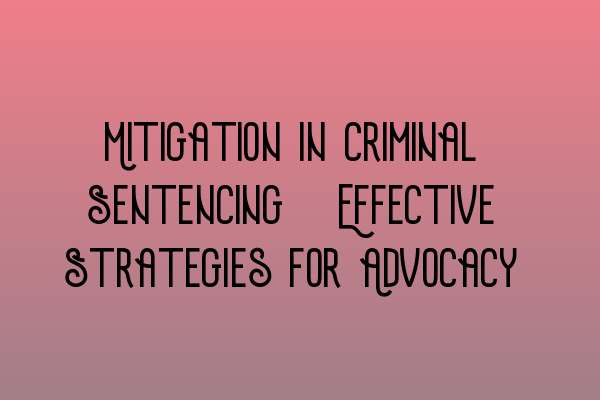Mitigation in Criminal Sentencing: Effective Strategies for Advocacy
Welcome to SQE Criminal Law & Practice Law UK! As experts in criminal law, we understand the importance of effective mitigation strategies during sentencing. In this blog post, we will uncover the key elements of mitigation and how lawyers can advocate for their clients to achieve the best possible outcomes.
Understanding Mitigation
Mitigating factors can play a crucial role in influencing the severity of a criminal sentence. They are circumstances that aim to reduce the defendant’s culpability or show a more complete picture of the situation. Effective mitigation strategies can help to humanize the accused, inspire empathy, and potentially lead to more lenient sentencing.
Some common mitigating factors include:
- Remorse and apology
- Lack of previous convictions
- Good character references
- Cooperation with law enforcement
- Mental health issues
Integrating these factors into your advocacy requires careful consideration and skillful presentation. Let’s explore some effective strategies for effectively incorporating mitigation into your criminal sentencing arguments:
1. Thorough Case Analysis
Before creating your mitigation strategy, it is crucial to thoroughly analyze the case. This includes reviewing all relevant evidence, understanding the client’s history, and identifying potential mitigating factors. This comprehensive approach allows you to develop a strong argument that resonates with the court.
2. Building Trust and Credibility
Effective advocacy requires establishing trust and credibility with the court. Emphasize your professional integrity, expertise, and knowledge of the law. This builds confidence in your ability to accurately present mitigating factors and increases the likelihood of a favorable outcome.
3. Compelling Narrative
Humanizing the accused through storytelling is a powerful technique. Craft a compelling narrative that showcases the defendant’s background, struggles, and potential for rehabilitation. Use vivid language to evoke emotions and create a connection between the court and your client.
For example, imagine a case involving a young offender charged with theft. Instead of simply presenting the facts, you can narrate a story that highlights the accused’s difficult childhood, lack of proper guidance, and genuine remorse for their actions.
4. Expert Testimony
Expert testimony can provide valuable insights into various aspects of a case. Engage the services of relevant experts such as psychologists, social workers, or substance abuse counselors to provide professional opinions on matters such as the defendant’s mental health, capacity for rehabilitation, or the impact of addiction.
The use of expert testimony strengthens your argument by providing objective evidence to support your claims, making it harder for the court to dismiss the mitigating factors you are presenting.
5. Impactful Character References
Gather evidence from family members, friends, or colleagues who can attest to the defendant’s positive character, contributions to the community, and potential for reform. Impactful character references can significantly influence the court’s perception of the accused and the sentence imposed.
Ensure that the character references are well-written, concise, and highlight specific examples that showcase the defendant’s positive attributes. This adds credibility to your mitigation strategy.
For more tips and guidance on effective mitigation strategies, check out our SQE 1 Practice Exam Questions or our SQE 1 Practice Mocks FLK1 FLK2. These resources provide valuable insights into criminal law and can help enhance your understanding and preparation for the SQE exams.
Conclusion
Advocating for effective mitigation strategies during sentencing is a crucial aspect of criminal law practice. By carefully analyzing the case, building trust, crafting compelling narratives, utilizing expert testimony, and presenting impactful character references, you can significantly influence the outcome of your client’s sentencing.
Remember to stay professional, empathetic, and persuasive in your approach. The use of these strategies, along with a deep understanding of the law, will contribute to your success as a criminal law practitioner.
